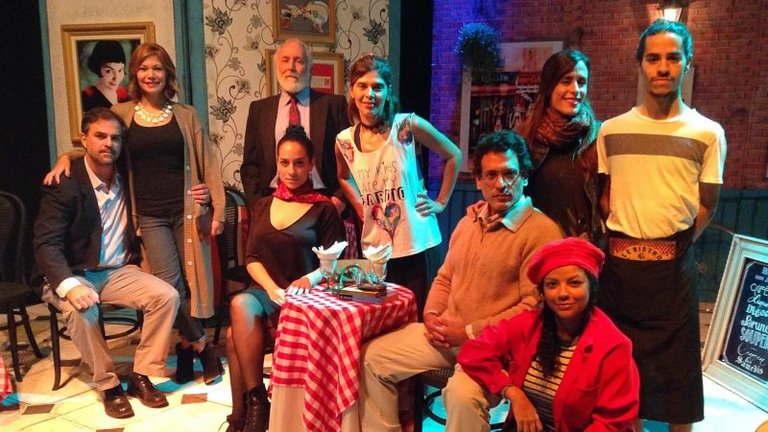In Venezuela, Theater is also Part of the Resistance

The theater, like any other artistic and creative activity that takes place in Venezuela, faces and reflects the national crisis that intensified in the last months. Economic, political and social struggles have been translated in deadly protests and numerous political turbulences including a referendum organized by opposition groups and the opening of a controversial constituent assembly.
The difficulties experienced on the streets permeate all areas of Venezuelans’ lives and are often used to project a climate of uncertainty on the stages that bring together the country's theater companies and groups.
Even just the planning, preparation, and setting-up of the plays, as well as the expectations that the actors, directors, and institutions linked to the theater make the play a reality represent a great achievement. For this reason, many of the theater companies that remain active in the country gathered their efforts under the #TeatroDeLaResistencia (#TheaterOfTheResistance) hashtag. An example of these efforts can be seen on the YouTube account of the theater company La Caja de Fósforos (The Matchbox), with actors impersonating protesters:
Global Voices spoke with Ana Melo, one of the most active representatives of the theater in Caracas, the capital of Venezuela, to understand the movements behind the hashtag and theatrical activity within the context of the crisis in Venezuela. The theater of resistance, as the actress and playwriter says, is a theater that refuses to die, has everything against it and wrestles with serious ethical and human problems. For Melo, the theater in Venezuela is a profession that, for many, seems useless:
Translation Original Quote
There are people who think that this does not make sense. (…) that the resistance which really resonates in society is done in the street and not on the stage. Therefore, actors suffer from a kind of low self-esteem in relation to their craft. Questions as to why do this or is the theater useful to the country in the midst of the greatest crisis in its history are on the minds of artists and in the acting space.
And yet,
Translation Original Quote
I feel that in part there is also an obsessive behavior. The idea we want to communicate is stronger. There is a need to communicate that is stronger than you, than the reluctance and even the crisis. Despite marches and crises, my struggle has continued to motivate the group of actors and nourish our vocation.
For Ana Melo, “theater has to do with the Venezuelan specificity, rather than with a political position”, and for this reason it feeds on each of the things that happen around it, all the stories that, after all, define it:
Translation Original Quote
They are like two opposing forces that coexist and are difficult to control: on the one hand, there is a disappointment, a sense of what am I doing this for. On the other hand, there is a kind of stubbornness, which is almost like an automatic thing: I have done this all my life. If there is a performance, I will go and that's it.
The reward
But, in all this crisis about the value of artistic activity in the national context, what is the motivation for these brave people who decide to continue their theatrical performance in Venezuela?
Ana Melo says that the reward is in that short moment after the presentation of a play, where someone tells you that the story that has been told and performed has left him thinking. Thus, the reward is knowing that the message was received, that it will remain in one or several minds, and that somehow a restlessness, which, for a time, was kept by an individual, leaves, occupies and changes those who have seen it materialize, have lived it and have appropriated it.
Translation Original Quote
[The creation] process entails pain. Something that hurts you a lot. Things that are generated from pain. In that sense, this process is a little tortuous, but delectable, too. And when someone says that he has seen the play and it left him thinking, it means that the play resonates somehow. That, for me, is a reward.
The theater can become a titanic work and it is painful once it ends. Once a work reaches the stage it hurts to let it go. However, there are always things to be said, so it all starts again … Almost like a punishment in a Greek tragedy. Theater is the way you can take everything that is happening, filter it, and assimilate it from another point of view. It connects you emotionally, helps you understand through emotion, it asks you questions.
For Melo the reward also comes in the very resistance of an art that from its beginnings has been linked to the political realities and that will exist and resist whenever there are groups and social dynamics developing. In short, as long as we have life, there will be a theater that will try to translate the human experience into an aesthetic act, necessary for the relief and for the awakening of consciousness.
Thanks for sharing your thoughts and information. Good work
Creative work buddy many more
Worldwide news about critics
Good article about ven